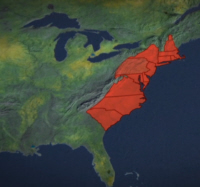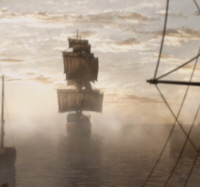American Colonies
Boston Tea Party
Andrew Marr’s History of the World - Age of Revolution
By now, the idea of a British absolute monarch had long gone. A Civil War, and then a peaceful revolution, had brought in something new - party politics. Votes and liberties protected by Parliament, which in those days sat on this spot. The British began to pride themselves on liberty and freedom of speech. One tiny flaw in the system was that as they colonised the rest of the world, it seemed that this great British invention wasn’t for export.
In 1773, what would become the United States of America consisted of 13 British colonies. People here thought of themselves as British, and they were ruled by courts using British laws, suffused by British Enlightenment ideas of liberty.

But the Americans were governed by a Parliament in London in which they had no political representation. And many were angry about it. Things came to a head in Boston, Massachusetts, in a row about taxes and tea. Tea was by far the most popular drink of the day. And the British imposed a tax on all the tea coming into the 13 colonies.
No, it wasn’t a very big tax, and actually the price of tea was going down. But for Americans being raised on the new Enlightenment ideas about the freedom of the individual, this was a matter of principle. Why should the London Parliament, which was six to eight weeks’ dangerous sailing time away, where they had no voice and no vote, be able to impose any taxes on the people here?
Samuel Adams

In Boston, this was about something even more important than tea - Liberty. Protesting against British taxes had become a major American hobby. And nobody was more dedicated to it than the local politician, Samuel Adams. “No taxation without representation. No to British tea taxes!”. When he heard that 94,000 pounds of tea were en-route to Boston, Adams resolved that not one ounce should land. Neither side was prepared to back down.
On November 28, 1773, the first of three British ships, the Dartmouth, sailed into Boston harbour. She was filled to the brim with tea from China, brought via Britain. Boston braced itself.

For 20 days, the ship was tied up at the dock, while Adams tried to persuade its captain to turn round and take the tea back to Britain. But the pro-British Governor of Boston refused to allow the ship permission to leave. Stalemate.
Rebellion was in the air. Samuel Adams didn’t have to say much to incite the crowd. A mob. The crowd were crying out for mob action. Across Boston, the rebels poured onto the streets and headed for the harbour. Many were dressed as Mohawk Indians. So why be dressed up as Mohawks? It may simply have been a disguise, but it’s also been suggested that this was supposed to symbolise freeborn Americans standing up against tyranny. If so, this was a bitter irony, because the real Mohawks were the original hunters, whose culture and whose land was being seized and destroyed by colonial America.
So this was a great struggle for liberty - for European immigrants. For native Americans, it was a disaster.

That night, 342 tea chests were tipped into the water. 46 tonnes of tea were destroyed, worth more than £1 million today.
The Boston Tea Party set the stage for the American Revolutionary War. That war would go on for eight years. But finally, 1783, the 13 colonies won their independence from Britain. The United States of America was now free to create a new kind of society and politics. The Declaration of Independence said, “We hold these truths to be self-evident - that all men are created equal, that they are endowed by their Creator with certain inalienable rights. Among these are life, liberty and the pursuit of happiness.” Here, in one document, was everything essential the Enlightenment stood for. For the first time in history, liberty and equality were claimed as the basis of a political system.

Of course, not everyone could be equal or free. Not native people, not blacks and not women of any colour. But still, these are remarkable words and certainly one of the foundation stones of the modern world.
When the United States came to create its own system of government, it shows an essentially parliamentary system of elected representatives. Powers were beginning to be transferred to the people. And although there was some chatter about an American monarch, they went for elected presidents. Some of whom have done perfectly well!
